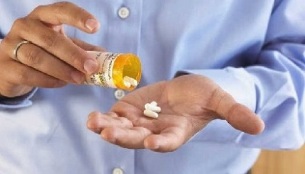
Antibiotics are prescribed to treat chronic prostatitis to eliminate the bacterial factor that causes inflammation of the gland.
The goal of antibiotic therapy is to relieve symptoms, prevent complications, and restore normal prostate function.
Funds are prescribed by your doctor based on the results of the test. The general name "antibiotics" refers to several groups of drugs with different compositions with pronounced antibacterial activity.
True antibiotics are substances of natural origin or their fully synthetic analogues.
Classification of chronic prostatitis
There are three main forms of chronic prostatitis:
- Chronic bacterial prostatitis
- is a change in the pathogenic microflora of the prostate gland. It has symptoms similar to those of acute prostatitis (pain during urination, presence of pus and blood in the urine, etc. ), but it has more obscure (milder) manifestations.
- Chronic, non-bacterial prostatitisis a type of damage to the male prostate gland caused by causes other than pathogenic bacteria (such as trauma or stone formation in the prostate) that can be detected in the presence of infectious diseases. However, the name of the pathology refers only to the etiology of the disease and not to its course, as in the process of pathogenesis the formation of the same pathogenic microflora as other types of prostatitis can be observed.
- chronic asymptomatic prostatitisis a pathology of the prostate gland caused by the presence of pathogenic microflora in the prostate area and is asymptomatic or almost asymptomatic. Important! If this type of disease is suspected, further diagnosis, usually based on the presence of pathological phenomena such as leukocyturia and / or bacteriuria, is required at the time of diagnosis. This is due to the course of chronic asymptomatic prostatitis with prostate cancer.
So, regardless of the type of chronic prostatitis, antibiotic medications are recommended in all cases. The drugs used in designating the therapeutic practice as the drug of choice are discussed below. And let’s start by offering antibiotics to readers for a list of chronic prostatitis.
What antibiotics are there?
Bacterial resistance to certain drugs has increased abruptly in recent years, so before starting antibiotic treatment for prostatitis in men, the patient should be tested for the entire STI group and the pathogenic flora to determine the resistance of certain microorganisms to certain drugs.
What antibiotics can be used to treat prostatitis at home? Antibacterial drugs belong to the following groups (the best antibiotics for prostatitis in men):
- Penicillins.In the past, such antibiotics have been actively used for prostatitis, with the advent of the most active antibacterial drugs, they have virtually lost their clinical significance due to the increased number of negative bacteria resistant to penicillins.
- Macrolides.These anti-prostatitis antibiotics have a broad spectrum and low toxicity.
- For tetracyclines. It has activity against gonococci, chlamydia, mycoplasma. It is more commonly used in the treatment of chronic infectious prostatitis caused by the above pathogens.
- fluoroquinolones.It is often used for the complex treatment of chronic inflammation of the prostate as well as for the uncomplicated acute inflammation of the prostate gland (efficiency up to 100%). They have high activity and low toxicity (do not disturb the intestinal microflora).
- Cephalosporins.It is actively used in the treatment of acute forms of bacterial prostatitis. These are good antibiotics against prostatitis, have a broad spectrum and have high activity against pathogenic bacteria.

However, modern medicine uses antibiotics against prostatitis or other diseases because of their capabilities:
- quickly destroys the source of the disease and eliminates inflammation;
- produces substances that kill or stop the growth of bacteria and large viruses, but are safe for the cells of the macroorganism;
- act externally (suppositories, ointments) and other methods of administration: intramuscularly, orally, intravenously;
- fight many pathogens (broad-spectrum antibiotics) at the same time.
What are the most effective antibiotics
Strictly follow your doctor's recommendations to treat or reduce the symptoms of infectious prostatitis. Only start the course after the diagnosis when the doctor understands the nature of the disease. Self-care at home has devastating consequences, a malfunction of the body’s system.
Recommendations for antibiotic therapy
The side effects of taking antibiotics can be just as unpleasant as the worsening of prostatitis.
Typical disadvantages of each class of drugs:
- Penicillins: rash, dermatitis, diarrhea;
- Cephalosporins: diarrhea. Rash and fever are rare;
- Macrolides: nausea, vomiting. Sometimes colitis, cholestatic jaundice occurs;
- Fluoroquinolones: abdominal pain, diarrhea.
Diarrhea is the most common side effect of antibiotics. It is provoked by two reasons: an imbalance in the intestinal microflora, an overgrowth of bacteria called Clostridium difficile. Prevention and elimination of diarrhea is possible by taking concomitant pro- and prebiotics.
Non-antibacterial therapy
In addition to antibiotics, the following treatments are used to successfully treat prostatitis, especially chronic prostatitis:
- Prostate massage is the best way to improve blood circulation and release inflammatory secretions from the prostate gland;
- physiotherapy;
- non-steroidal anti-inflammatory drugs - not used concomitantly with fluoroquinolones;
- herbal preparations;
- alpha-blockers.
In order to cure the disease effectively, a diagnosis must be made that shows what types of bacteria are causing the disease in the given patient, their sensitivity to drugs. Based on the results of the test, your doctor will decide what tools to treat for chronic prostatitis or an acute form of the disease.
























